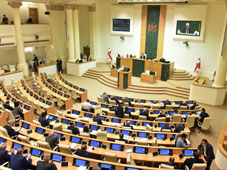
The parliament adopts a bill about extending the time period of enjoining restrictions amid COVID-19
By Khatia Bzhalava
Thursday, July 16
At the special session, on July 14th, Healthcare and Social Issues Committee discussed for accelerated consideration and supported the legislative bill on the Public Health and Criminal Procedure Code, which enables the government to enjoin individual Covid-19 preventive restrictions without declaring a state of emergency till the end of the year. According to the previous also controversial bill adopted two months ago, this power was assigned to the executive branch until July 15th. The opposition did not participate in voting and protested re-extension of the terms as they considered the disconnection of the parliament from the process to be unconstitutional.
In order to attend the special session, political party European Georgia had aborted boycott. Political opposition European Georgia and fraction Independent Members of Parliament, as well as Parliament’s independent deputies, regard the bill as a tool from the government to restrict the supervisory function of the parliament and suppose that the ruling party will use the amendments for their political purposes.
According to the statement of the Parliament of Georgia, one of the initiators of the bill Dimitri Khundadze noted that in order to be prepared for the possible second wave of the virus, the government should be eligible to manage the situation without declaring the state of emergency, therefore “we must extend Public Health Law until the New Year.”
Khundadze also explained that the mobility of the elections could affect the spread of the virus and he believes that in order for the process to be led properly, the government should be granted with a leverage.
Georgian Young Lawyers Association(GYLA) also negatively estimates the decision of the parliament, which enables the authority to restrict rights under the sublegislative acts.
As GYLA notes in its statement, even though enjoining such regulations regarding the spread of the coronavirus serves a legitimate purpose, authorising the government with a power of restricting rights does not comply with the standard of Constitution and GYLA believes that mentioned regulations must be enjoined in accordance with a law.
GYLA states that the edge of restricting rights established by the constitution of Georgia as well as the standard of Human Rights and main freedom protection convention requires the rights to be restricted according to the law, with such juridical document that has been adopted with the high legitimacy and extensive engagement of the society. As the statement reads, the sublegislative normative act endorsed on July 14th is not an example of such a document.


